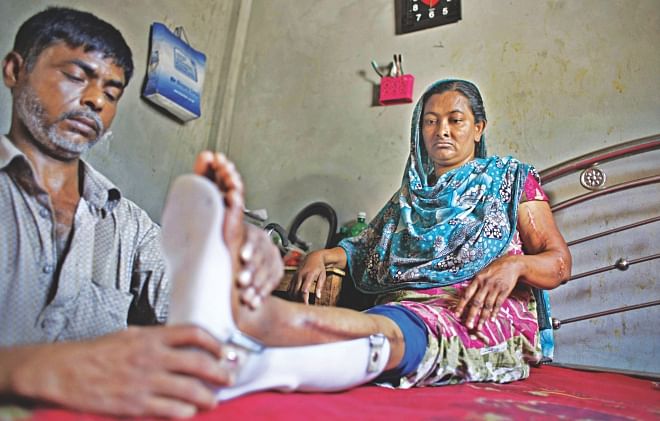Survived, only to suffer

Thirty-five-year-old Feli limps to her rented room from the small grocery store she opened three months ago with the help of the Centre for Rehabilitation of the Paralysed (CRP).
One of the 1,500 pulled out alive from the rubble of Rana Plaza, she has a paralysing feeling in her left leg and is unable to bend her left arm. Her physical weaknesses have left her dependent on her husband to run the store and for household chores.
Feli's husband Hasu Miah, 40, had to quit his job as a caretaker at a house nearby to take care of his wife and 11-year-old daughter. The family's financial hardships have deepened as their monthly income has dropped to a third of Tk 18,000 that they earned collectively a year before.
“It has been two months that we cannot pay rent for our home and the grocery shop. Our daughter's school fees are also due,” said an ailing Feli, who has no surname.
She had been trapped under a broken roof and beam for three days before she was rescued.
One year has passed since the deadliest apparel industry disaster in Savar on April 24 last year that killed over 1,134 workers and left nearly 2,000 injured. The families that had migrated from their rural homes in the hope of a better life are struggling to make ends meet.
Although injured workers and families of the dead received some financial support from the government, non-government organisations, individuals and British retailer Primark, a major portion of the money has been spent for medical, food and other expenses.
Death of breadwinners, physical ailments, and many survivors' reluctance to work in the garments, have emerges as adversities for the families.
Falling deep into debt, families of the injured and dead face pressures as they are struggling to pay rent of their homes and shops and for children's education and to support their elderly dependents.
An ActionAid Bangladesh survey report released on April 20 showed that 66 percent of 1,436 survivors are facing stark difficulties in meeting their daily needs. As many as 1,058 of them have not returned to work, according to the report.
"My daughter was the main breadwinner of our family. Her death has left us in a tough situation," said 45-year old Hena Begum, mother of missing worker Akhi Akhter.
Akhi's family got Tk 79,000 as immediate assistance from British retailer Primark, local institutions and individuals. The family has already spent 70 percent of the money on basic needs in one year.
Before the Rana Plaza collapse, Akhi and her mother used to work at garment units housed in the building and earn together Tk 17,500 per month.
Akhi's father, Nanna Sheikh, is a hawker but often fails to work as he is an asthma patient.
The family now runs of a mere Tk 5,500 that Hena earns from work at a knitwear factory.
"We have cut our expenditure on food; before Akhi's death, we bought food with cash. Now we buy food on credit," said Hena, who shifted to a low-rent house.
Seventeen-year old Shefali has survived the building crash after being buried in rubble for three days, but her family is finding it hard to bear the economic strains that have followed.
She is now so traumatised that she would rather be unemployed than return to work at a garment factory.
"We were a happy family when Shefali and her father used to work. But it has now become tough, as the family income has halved," said Morium Begum, her mother.
Finding no other way to make ends meet, Shefali's parents sent their 13-year-old son to a printing house in February to work as a helper.
Yeanur Akter's family is going through difficult times too. With two of her legs badly injured, she is unable to walk.
She and her mother used to earn Tk 13,000 a month together working for Ether Tex in Rana Plaza. Her father, Yunus Munshi, used to sell “chatpati” worth Tk 6,000 a month.
Yeanur lost her mother to the collapse and she spent the last nine months being hospitalised at CRP. Her family's income has dropped; her father still has to manage Tk 2,000 a month for house rent, and costs for food and education for his four children.
She received Tk 10,000 so far from the government as support, and Tk 300,000 as compensation for the death of her mother, Anowara.
Yunus had no other choice but to send two of his sons to an orphanage in Chittagong. He now plans to open a small shop so he can take care of his four children.
"But I have no idea where I will get the money from," he said.
Aamanur Rahman, deputy director of ActionAid, says the victims' quality of life shows that quick compensation has become urgent.
"It has to be done in a coordinated manner," he told The Daily Star.
Following the tragedy, dependents have become vulnerable, he warned. "As a result, boys might get involved in hazardous work while adolescent girls are at risk of early marriage, forced marriage and trafficking.
"Unless compensation is distributed quickly, many may fall into abject poverty."
Feli and Hashu now have a debt of Tk 20,000, along with two months of house rent and electricity bills at the shop.
"We are in great trouble. If things get any worse, perhaps we will have to return to our village," Hashu said.
Garment workers migrate from rural areas since their villages do not offer much employment opportunities, Aamanur said.
“If they are pushed back to their villages, there is no guarantee they will get a decent livelihood."

 For all latest news, follow The Daily Star's Google News channel.
For all latest news, follow The Daily Star's Google News channel. 



Comments